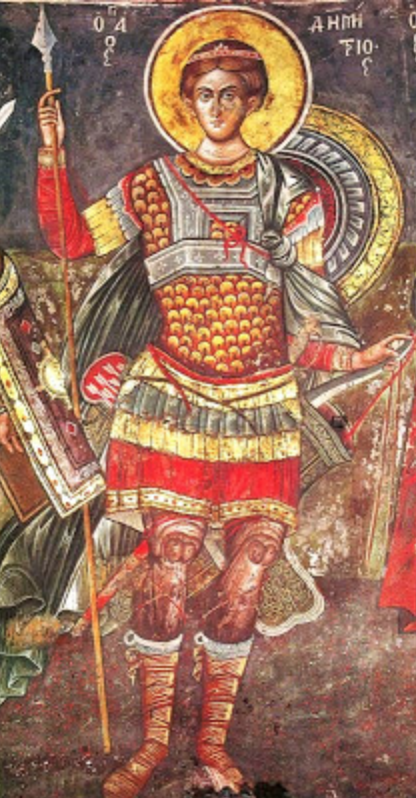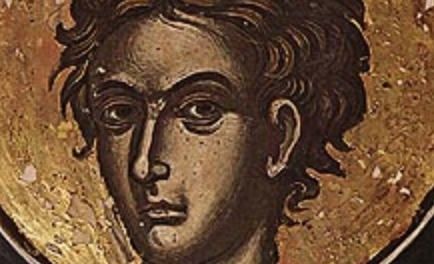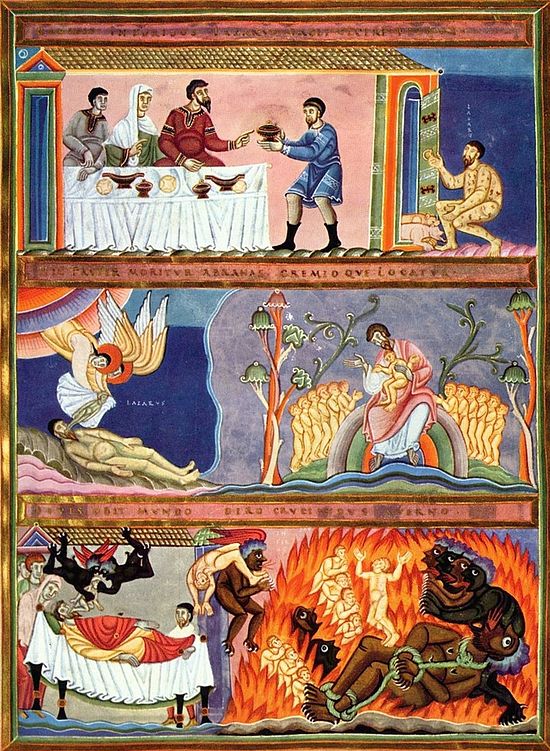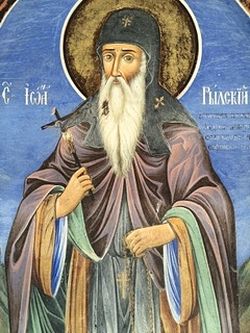Venerable Dragutin (Theoctistus in Monasticism) of Serbia
Saint Dragutin was the brother of Saint Stephen Milutin, the son of King Stephen Urosh I, and the grandson of First-Crowned King Saint Stephen (September 24). Dragutin, a true Christian, after a short reign, abdicated in favor of his brother Stephen. He withdrew to Srem, secretly living as an ascetic in a grave which he dug with his own hands. During his righteous life, Saint Dragutin toiled much over converting the Bogomil heretics to the true Faith. He surrendered his soul to God on March 2, 1316.
Holy, Glorious Demetrius the Myrrh-gusher of Thessalonica
 The Great Martyr Demetrius the Myrrh-gusher of Thessalonica was the son of a Roman proconsul in Thessalonica. Three centuries had elapsed and Roman paganism, spiritually shattered and defeated by the multitude of martyrs and confessors of the Savior, intensified its persecutions. The parents of Saint Demetrius were secretly Christians, and he was baptized and raised in the Christian Faith in a secret church in his father’s home.
The Great Martyr Demetrius the Myrrh-gusher of Thessalonica was the son of a Roman proconsul in Thessalonica. Three centuries had elapsed and Roman paganism, spiritually shattered and defeated by the multitude of martyrs and confessors of the Savior, intensified its persecutions. The parents of Saint Demetrius were secretly Christians, and he was baptized and raised in the Christian Faith in a secret church in his father’s home.
By the time Demetrius had reached maturity and his father had died, the emperor Galerius Maximian had ascended the throne (305). Maximian, confident in Demetrius’ education as well as his administrative and military abilities, appointed him to his father’s position as proconsul of the Thessalonica district. The main tasks of this young commander were to defend the city from barbarians and to eradicate Christianity. The emperor’s policy regarding Christians was expressed simply, “Put to death anyone who calls on the name of Christ.” The emperor did not suspect that by appointing Demetrius he had provided a way for him to lead many people to Christ.
Martyr Nestor of Thessalonica
 The holy Martyr Nestor was very young in age, handsome in appearance, and he was known to the holy Great Martyr Demetrios (October 26), for he had instructed Nestor in the faith.
The holy Martyr Nestor was very young in age, handsome in appearance, and he was known to the holy Great Martyr Demetrios (October 26), for he had instructed Nestor in the faith.
The Emperor was visiting Thessaloniki, and he built a high platform in the midst of the city so that a gigantic barbarian named Lyaios could wrestle there and be seen by everyone. Beneath the platform many spears and other sharp weapons were placed pointing upward. When Lyaios defeated his opponents, he threw them down onto the spears and they died. Many Christians were forced to fight Lyaios, and were killed. When Nestor saw how Emperor Maximian rejoiced over the victories of his champion, he disdained his pride. Seeing the miracles of Saint Demetrios, however, he took courage and went to the prison where the holy Martyr was confined, and fell at his feet.
Homily on the Rich man and Lazarus
 There was a certain rich man, which was clothed in purple and fine linen, and fared sumptuously every day: And there was a certain beggar named Lazarus, which was laid at his gate, full of sores, and desiring to be fed with the crumbs which fell from the rich man's table: moreover the dogs came and licked his sores. And it came to pass, that the beggar died, and was carried by the angels into Abraham's bosom: the rich man also died, and was buried; and in hell he lift up his eyes, being in torments, and seeth Abraham afar off, and Lazarus in his bosom. And he cried and said, Father Abraham, have mercy on me, and send Lazarus, that he may dip the tip of his finger in water, and cool my tongue; for I am tormented in this flame. But Abraham said, Son, remember that thou in thy lifetime receivedst thy good things, and likewise Lazarus evil things: but now he is comforted, and thou art tormented. And beside all this, between us and you there is a great gulf fixed: so that they which would pass from hence to you cannot; neither can they pass to us, that would come from thence. Then he said, I pray thee therefore, father, that thou wouldest send him to my father's house: For I have five brethren; that he may testify unto them, lest they also come into this place of torment. Abraham saith unto him, They have Moses and the prophets; let them hear them. And he said, Nay, father Abraham: but if one went unto them from the dead, they will repent. And he said unto him, If they hear not Moses and the prophets, neither will they be persuaded, though one rose from the dead.
There was a certain rich man, which was clothed in purple and fine linen, and fared sumptuously every day: And there was a certain beggar named Lazarus, which was laid at his gate, full of sores, and desiring to be fed with the crumbs which fell from the rich man's table: moreover the dogs came and licked his sores. And it came to pass, that the beggar died, and was carried by the angels into Abraham's bosom: the rich man also died, and was buried; and in hell he lift up his eyes, being in torments, and seeth Abraham afar off, and Lazarus in his bosom. And he cried and said, Father Abraham, have mercy on me, and send Lazarus, that he may dip the tip of his finger in water, and cool my tongue; for I am tormented in this flame. But Abraham said, Son, remember that thou in thy lifetime receivedst thy good things, and likewise Lazarus evil things: but now he is comforted, and thou art tormented. And beside all this, between us and you there is a great gulf fixed: so that they which would pass from hence to you cannot; neither can they pass to us, that would come from thence. Then he said, I pray thee therefore, father, that thou wouldest send him to my father's house: For I have five brethren; that he may testify unto them, lest they also come into this place of torment. Abraham saith unto him, They have Moses and the prophets; let them hear them. And he said, Nay, father Abraham: but if one went unto them from the dead, they will repent. And he said unto him, If they hear not Moses and the prophets, neither will they be persuaded, though one rose from the dead.
Always hungry, the suffering Lazarus wished to eat if only the crusts that fell from the rich man’s table, the ones that were thrown to the dogs before his very eyes, but apparently not even those were made available to him. No one pitied his sickness, no one bandaged his wounds, and the dogs licked them, which prevented them from healing. The unfortunate man died, the rich man also died, and after death their positions reversed. Each received his reward—Lazarus was carried up by angels to paradise, and the rich man was cast into hell. The rich man in his terrible torments remembered his wasted life; he could see the poor man Lazarus who suffered outside his gates and thus constantly reminded him of his sufferings, to which he nevertheless paid no attention and never helped him in any way. Wondering where that sufferer was now and what became of him, the rich man suddenly saw him standing with Abraham, and he begged, “Father Abraham! Send me Lazarus to ease my torment!” “My son!” replied Abraham, “Remember your life!”
The Testament of St. John of Rila
 This is the spiritual testament of the most famous Bulgarian saint, John of Rila (Ioan Rilski), which he wrote and signed on 25 March 941, five years before his death. St. John of Rila was a hermit who brought together a group of monks that led to the founding of Rila Monastery in southwest Bulgaria, a World Heritage Site. This was less than a hundred years after the mass conversion of Bulgaria to Christianity under their king Boris I, an Orthodox saint, in 865.
This is the spiritual testament of the most famous Bulgarian saint, John of Rila (Ioan Rilski), which he wrote and signed on 25 March 941, five years before his death. St. John of Rila was a hermit who brought together a group of monks that led to the founding of Rila Monastery in southwest Bulgaria, a World Heritage Site. This was less than a hundred years after the mass conversion of Bulgaria to Christianity under their king Boris I, an Orthodox saint, in 865.
I, the humble and sinful John, who have never done any good on the earth, when I came to this Rila wilderness, found no man in it, but only wild beasts and impenetrable thickets. And I lived here alone with the beasts, without any food or shelter, but the sky was my shelter, the earth my bed and herbs my food. Blessed God, however, for the love of Whom I despised everything and endured hunger and thirst, frost and summer heat, and bodily nakedness, did not abandon me in the slightest, but like a good and indulgent father plentifully provided all my needs. And what do I have to give the Lord in return for all that He has given me? Many are His blessings towards me, since He looked down from His holy heights on my humility and helped me to endure everything – not me, but Christ’s strength which is in me, because every good deed is from Him and every perfect gift proceeds from on high.






